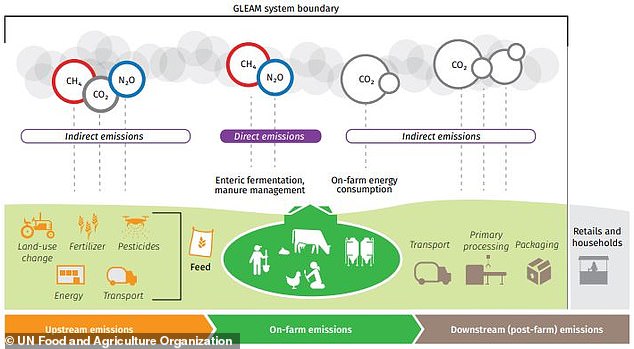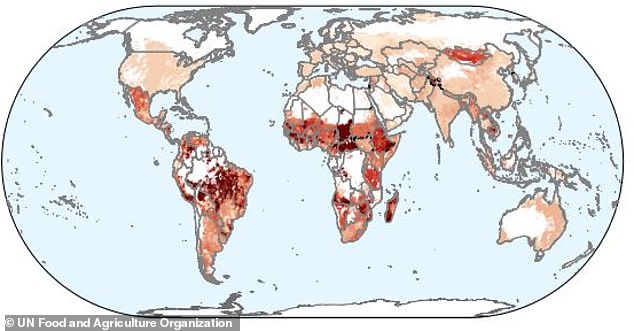Ditch the nut roast and enjoy your turkey in peace this Christmas! Going vegetarian is not as good for the climate as campaigners claim – and only slashes your carbon footprint by 4.4%, UN report reveals
For the environmentalists among us, a plate of turkey may once have been accompanied by a side of climate guilt.
However, meat lovers will be in high spirits this Christmas, as a new report reveals that a vegetable-based diet is not as environmentally friendly as once thought.
In its new report to the Food and Agriculture Organization of the United Nations (FAO), the United Nations says replacing meat with plant protein reduces your carbon footprint by up to four percent.
“The expected decline in middle-income countries is marginal (4.4 percent),” the report said.
'With emissions increasing in some countries due to increased consumption of nuts, fruits and vegetables, partly grown in greenhouses.'
For the environmentalists among us, a plate of turkey may once have been accompanied by a side of climate guilt. However, meat lovers will be in a festive mood this Christmas as the UN reveals that a vegetable-based diet is not as environmentally friendly as previously thought (stock image)
The report used an advanced modeling tool to study sources of greenhouse gases in animal product production.
Previously, the United Nations and a number of climate campaign groups have called for a shift away from a diet high in meat, eggs and dairy products.
However, this latest study found that going meat-free in middle-income countries, such as India or China, would only lead to a 4.4 percent reduction in greenhouse gas emissions.
For those living in high-income countries, such as the United Kingdom or the United States, making the change could cut greenhouse gas emissions by between 13 and 17 percent.
Across all 37 countries studied in the report, a complete change would lead to a 2 to 5 percent reduction in emissions associated with the entire global food system.

Previous studies 'oversimplify' the benefits and plausibility of switching to a vegetarian diet for most of the world's population, making agriculture more efficient would lead to greater reductions of the trade-off (stock image)

Farm animals produce greenhouse gas emissions at every stage of production, but especially as direct emissions of methane produced by livestock
“Some studies may oversimplify” the climate benefits and plausibility of switching to plant-based diets, the report authors wrote.
They say that these recommendations assume “an immediate global nutritional transformation, while neglecting the nutritional challenges and financial constraints that may make such changes infeasible, especially for the world’s poorest people.”
The report indicates that there are wide differences between the carbon costs of different production methods.
“Replacing meat with calorie-equivalent greenhouse vegetables or out-of-season fruits transported from afar could reverse many greenhouse gas emissions offsets,” the authors explain.
As the world's population grows, demand for meat products is expected to increase in most parts of the world, even as demand remains level or even declines in Europe.
Researchers predict that by 2050, demand for animal products will increase by 20 percent globally.
Without any change in farming techniques, this would result in greenhouse gas emissions equivalent to 9.1 billion tons of carbon dioxide per year.
However, by improving the efficiency of animal husbandry methods, greenhouse gas emissions can be reduced by up to 30 percent.
Efficiency gains in dairy farming alone contribute between 38 and 46 percent of total emissions reductions by 2050, the report found.

This graph shows the emissions intensity of producing one kilogram of edible protein, with darker colors representing higher intensity
“Solutions such as improving animal health and husbandry practices, reducing food loss and waste, and directly targeting greenhouse gas emissions, have the potential to provide multiple benefits for people and the planet,” said Ms. Maria Helena Semedo, Deputy Director-General of the Food and Agriculture Organization of the United Nations. Agriculture Organization.
“But it requires investments in the sector to narrow efficiency gaps, while meeting the growing global demand for animal protein.”
The researchers also looked at the possibility of replacing animal protein with plant-based “meat” and lab-grown alternatives.
Other UN reports suggest that meat alternatives could feed humans more sustainably.
“New alternatives to animal-source foods can play an important role in transforming us in ways that are more sustainable, healthier and less harmful to animals, humans and the planet,” says Professor Mario Herrero.
However, this latest report says the climate impact of lab-grown meat is not yet fully understood and depends largely on the type of energy used.
In addition, the report's authors write that: “Animals' roles in providing financial security, status, and social value beyond their nutritional value may be compromised, leading to greater inequality between high- and low-income countries.”
(Tags for translation)dailymail
